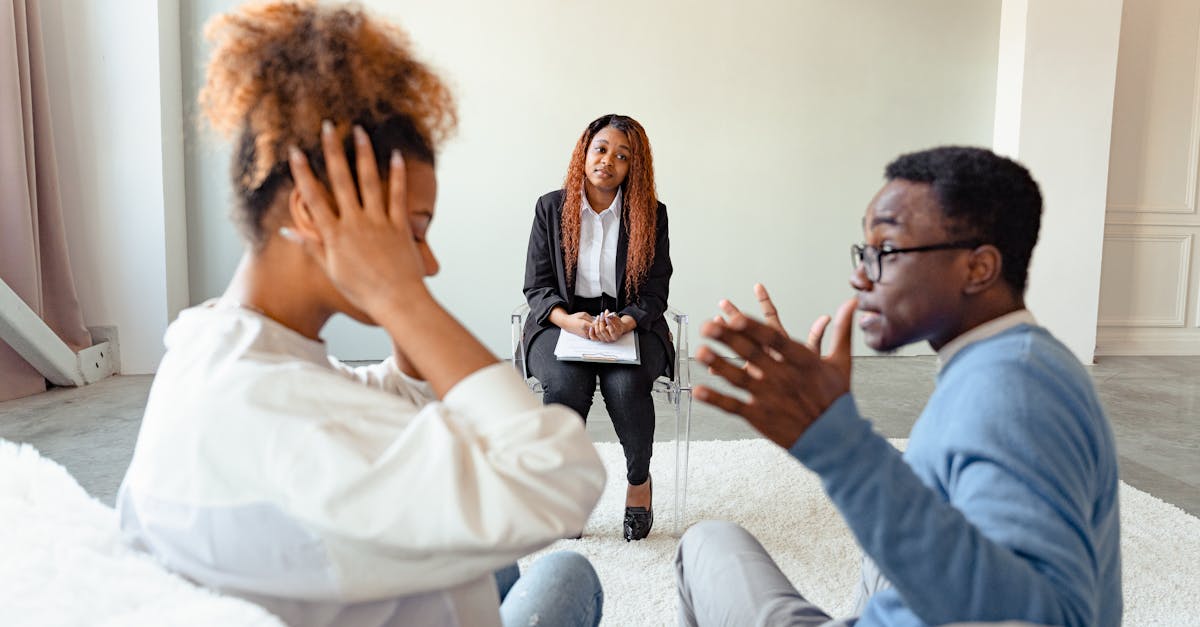
At Jacksonville Marriage Counselor, we understand that every relationship faces its unique challenges, and our Couples Counseling service is designed to help partners navigate through these difficulties with empathy and support. Our experienced counselors create a safe and nurturing environment where couples can openly discuss their feelings, improve communication, and resolve conflicts. We utilize evidence-based techniques tailored to each couple's specific needs, empowering them to strengthen their emotional connection and foster a healthier relationship. Whether you're dealing with routine struggles or more serious issues, our goal is to guide you both toward a happier, more fulfilling partnership.
Techniques Used in Couples Counseling
Couples counseling employs various techniques aimed at improving communication and fostering healthier interactions between partners. One common approach is Cognitive Behavioral Therapy (CBT), which focuses on identifying and changing negative thought patterns that contribute to conflicts. Structured exercises often help couples gain insight into their behaviors and develop strategies for more constructive dialogue. Additionally, Emotionally Focused Therapy (EFT) emphasizes emotional awareness and bonding, guiding couples to express their feelings openly while learning to respond to each other with empathy.
Another effective technique is the use of role-playing, allowing partners to step into each other's shoes and view situations from the other's perspective. This practice can break down misunderstandings and promote greater compassion. Furthermore, therapists often introduce communication skills training that emphasizes assertiveness and active listening. These skills empower couples to articulate their needs more clearly while also fostering an environment where both partners feel heard and validated.
Exploring Different Therapeutic Approaches
Various therapeutic approaches can be employed in couples counseling to address the unique dynamics of each relationship. Cognitive-behavioral therapy (CBT) focuses on identifying negative thought patterns and behaviors that may contribute to conflicts. This method helps partners develop healthier ways to communicate and interact with each other. Emotionally focused therapy (EFT) aims to strengthen emotional bonds by exploring underlying attachment issues and fostering empathy. This approach can create a safe environment for partners to express their feelings and needs.
Another avenue explored in couples counseling is the use of narrative therapy. By encouraging partners to share their individual stories and perspectives, this method helps them understand how these narratives influence their relationship. Solution-focused brief therapy emphasizes finding practical solutions to specific problems rather than delving into the root causes. Each of these techniques offers distinct advantages, allowing couples to choose the approach that best fits their situation and goals.
The Role of Communication in Relationships
Effective communication serves as the bedrock of any strong relationship. Couples who prioritize open dialogue are more likely to articulate their feelings, needs, and concerns without fear of judgment. This openness fosters understanding and reduces the likelihood of misunderstandings, allowing partners to navigate conflicts more smoothly. Some couples opt for structured methods to enhance their conversations, ensuring that both individuals feel heard and respected throughout discussions.
Active listening is a critical component of communication that often goes overlooked. Couples must not only express their thoughts but also engage with their partner's perspective. By validating each other's feelings and demonstrating empathy, partners create a safe space for honest exchanges. This practice strengthens emotional bonds and cultivates a deeper connection, making it easier for couples to address sensitive topics with care and consideration.
Enhancing Listening Skills
Active listening is essential in any relationship. It involves fully engaging with your partner while they express their thoughts and emotions. This means putting aside distractions and focusing entirely on their words, tone, and body language. By doing this, partners create a safe space for open dialogue, which can lead to deeper understanding and connection. Recognizing when to use verbal affirmations or non-verbal cues can also enhance this process, showing your partner that you are genuinely interested in what they have to say.
Practicing empathy is another critical aspect of effective listening. This requires setting aside personal judgments and striving to understand your partner's perspective. Responding with validating statements helps your partner feel heard and appreciated. To improve these skills, couples might consider structured activities, such as “listening circles,” where each person takes a turn to speak uninterrupted, fostering an environment of respect and understanding. Over time, these techniques can significantly improve the quality of communication within the relationship.
Overcoming Trust Issues
Trust issues can arise for various reasons within a relationship, often stemming from past experiences or unmet expectations. Couples dealing with these challenges may benefit from open discussions about their fears and anxieties. Creating a safe environment where both partners can express themselves fosters vulnerability. This process helps to clarify misunderstandings and identifies the root causes of distrust.
Rebuilding confidence in a partnership requires a commitment from both partners to engage in consistent, honest communication. Transparency regarding feelings and actions becomes essential. Establishing boundaries and holding each other accountable can reinforce trust over time. Couples may also explore activities that create shared positive experiences, nurturing a foundation of reliability and connection.
Rebuilding Confidence in Your Partnership
Building trust and confidence is essential for a healthy partnership. Couples often face challenges that can erode their sense of security in the relationship. To effectively rebuild confidence, both partners must openly discuss their feelings, affirm each other's worth, and acknowledge past mistakes. This transparency creates a safe space where both individuals can express concerns and work through their problems.
Engaging in shared activities can foster deeper connections and strengthen trust. Finding common interests helps couples bond and can rekindle feelings of intimacy. Regularly checking in with one another, both emotionally and mentally, reinforces a united front. As partners navigate the journey of rebuilding, active participation and commitment from both sides are crucial for lasting change.
FAQS
What is couples counseling?
Couples counseling is a form of therapy aimed at helping partners improve their relationship, resolve conflicts, and enhance communication through guided discussions with a trained therapist.
How long does couples counseling typically last?
The duration of couples counseling can vary, but sessions often last between 45 to 90 minutes, with the overall process ranging from a few sessions to several months depending on the couples' needs and goals.
What techniques are commonly used in couples counseling?
Common techniques include communication exercises, role-playing, cognitive-behavioral strategies, and emotion-focused therapy, all designed to help couples understand each other better and work through their issues.
How can couples improve their communication skills during counseling?
Couples can improve their communication skills through active listening exercises, expressing feelings and needs clearly, and learning to validate each other's perspectives, all of which are often practiced in counseling sessions.
What should we expect during our first couples counseling session?
During the first session, couples can expect to discuss their reasons for seeking help, share their relationship history, and set goals for therapy. The therapist will also explain the counseling process and establish a safe space for open dialogue.

